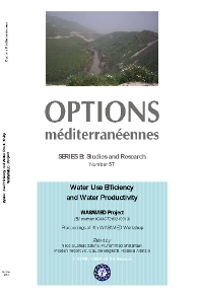| Article précédent | p. 73-79 | Article suivant |
Techniques for improving water use efficiency in greenhouse cultivation in Cyprus
Recently particular emphasis was laid on protected cultivation and more specific on cultivation of vegetables and flowers on substrates and soilless cultures (closed systems and open with minimum drainage). New unites with soilless cultivation (mainly perlite, coconut and rockwool) have been established applying modern greenhouse technology and fully computerized irrigation-fertigation methods. At the Agricultural Research Institute the use of local materials i.e. perlite, mixtures of perlite with pomace, almond shells, pine bark, gravel, etc. have been tried successfully. In this paper, results of the application of modern techniques, hydroponic cultures, re-circulation of irrigation water and nutrient solution in closed systems and control of the climatic conditions in the greenhouse (temperature, air humidity, CO2, etc) will be discussed. The introduction of modern technology and soilless culture in greenhouse cultivations (vegetables and flowers) resulted in higher production, better quality, efficient and effective use of water and fertilizers and minimize the use of chemicals for pest and disease control. The use of closed recirculation systems has reduced the water needs of the cultivations close to the evapotranspiration levels of the crop. Ongoing research on using a green lagoon to de-nitrifigate the reject water from the closed system, when the undesired elements in it reach toxic levels, seems to be very promising. The grown Sudan-grass in the lagoon can be used as animal feed or as an energy plant.
- [ Afficher ]
- [ Télécharger ]
- [ Exporter la citation ]
Vous pouvez télécharger la citation au format :
- [ Imprimer ]
-
Mots-clés
CHYPRE, CULTURE HYDROPONIQUE, SUBSTRAT DE CULTURECiter cet article
Polycarpou P., Chimonidou D., Papadopoulos I. Techniques for improving water use efficiency in greenhouse cultivation in Cyprus. In : Lamaddalena N. (ed.), Shatanawi M. (ed.), Todorovic M. (ed.), Bogliotti C. (ed.), Albrizio R. (ed.). Water use efficiency and water productivity: WASAMED project. Bari : CIHEAM, 2007. p. 73-79. (Options Méditerranéennes : Série B. Etudes et Recherches; n. 57). 4. WASAMED (WAter SAving in MEDiterranean agriculture) Workshop, 2005/09/30-2005/10/04, Amman (Jordan). http://om.ciheam.org/om/pdf/b57/00800779.pdf



